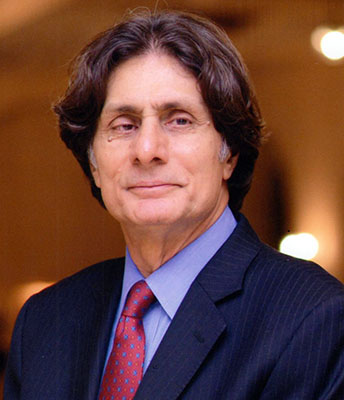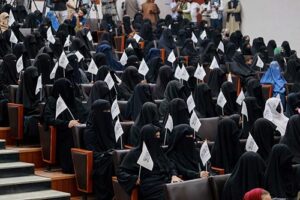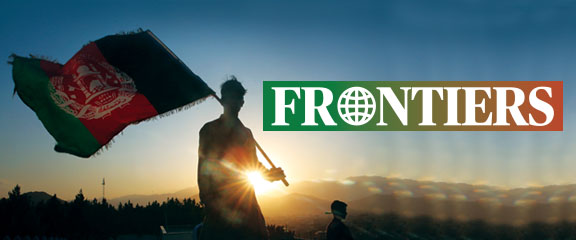“I am involved in the land of a Leonine (lion-like) and brave people, where every foot on the ground is like a wall of steel, confronting my soldier. You have brought only one Alexander into the world, but every Afghan mother, in this land, has brought an Alexander in the world.”— Alexander The Great

The writer is a Special Assistant to the Prime Minister on Information.
With irreconcilable divergences separating the United States and the Western world from Pakistan and the regional countries, the best that can be hoped for is that all stakeholders — the US, the Europeans and the regional powers around Afghanistan — are able to engage constructively in an earnest effort to learn ways to co-exist peacefully.
How would one describe a people, who are beyond any stereotype narrative? They are a rare combination of the opposites: they can be unbendingly rigid and they can be sublimely flexible. Getting access to any of these qualities would depend upon the way you approach them, the way you interact with them.
Dealing with Afghanistan and its people has been an absolute pleasure as it also has been a cause of limitless confusion and, at times, even frustration. But there is a consistent: you never fall out of love with this beautiful land and its enchanting people. They are embedded with boundless spirit and indomitable courage to face the worst with steadfastness and resilience. That’s what make them the Afghans that the world has known through the centuries, but still trying to understand and assimilate. Some would say it is a tough job. I see it as an extremely engrossing phenomenon which one never tires of pursuing.
Afghanistan has been the melting pot of diverse cultures and civilisations and the pathway of conquering as also retreating armies. It has been a familiar passage of countless forays into the Indian sub-continent with local generals as well as those from Central-Asian countries marching through this limitless expanse for their stints in power for varying time periods: the Mamluks, Ghaznavids, Khiljis, Tughlaqs, Sayyids, Lodhis and the Mughals who earned the most fame as intrepid fighters and efficient administrators. They also introduced Islamic architecture to the sub-continent, leaving behind a heritage rich in taste and culture.

The Afghans we meet today have a bit of all these qualities within them. They come across as hardened fighters who are unbending in their principles and resolve. They have immeasurable stocks of patience which they virtually use as a strategic asset, both in times of war and peace. It is generally said that while the world may have the clock, it is the Afghans who have time. Their commitments, be those to friendship or enmities, are spread across generations. They don’t forget, and hardly forgive.
But, then it is also true that the Afghans are perceived to cherish living on the brink, or that is how they have had it through decades. They have fought off attacks and never submitted before the mightiest of them: the British, the Russians and the US. No wonder, Afghanistan is known as the graveyard of empires. The most powerful conquerors have also tasted defeat at the hands of apparently ill-armed and ill-trained Afghans.
Afghanistan stands at the crossroads of history again. The exit of the US and NATO troops from the country after an occupation that lasted more than two decades has left a gnawing vacuum which needs to be filled. But there appears to be no easy way to do so. The US and its allies left behind a trail of destruction in multiple ways including an administration that was corrupt to the core and that just melted away in the face of the eventual Taliban onslaught. But it has not been one of those smooth transitions from one government to the next. The US seems to be on a revenge course to extricate its pounds of flesh from a country which is virtually teetering on the verge of a massive humanitarian crisis. While the Taliban seem to be militarily in control of the whole country, there is neither an effective and efficient administration in place, nor the requisite funds to run it.
Washington has frozen over $9 billion in Afghan central bank assets. They have also imposed sanctions virtually cutting off the country from the global financial system which has caused a massive economic meltdown. The United Nations (UN) and the European Union (EU) have sanctioned aid packages, but banks remain unable to transmit these funds to the beleaguered country for fear of reprisals from the US. So, not only is there no current transmittal of funds to Afghanistan, there also does not appear to be a way this could happen in the near future. Together with the refusal to accord formal recognition to the new regime, these are tactics used to pressure the Taliban to do the West’s bidding. If they don’t, which is the likelier scenario, the limbo persists and the humanitarian crisis would accentuate.

The current Taliban rule is by no means a replication of the last time they held power in Afghanistan. Granted that the progress towards installing an inclusive government or facilitating the right to education for women at all levels without discrimination may have been slow, but it is also true that steps are being taken in that direction. While primary and university level education has already been available, secondary level schools for girls have been opened in some northern provinces including Kunduz, Balkh and Jowzjan. There is still considerable distance to cover, but distinct movement is visible to achieve the desired objectives.
It must also be conceded that many of the mandatory requirements of their past rule have not been ordered this time. There is no requirement for sporting beards, music has not been banned and women are allowed to leave their homes whenever they may desire to do so. No curbs have been placed on media and broadcasting channels keep operating. Internet is available and social media has not been subjected to any curbs. The religious police are not visible to impose an excessively orthodox code. These are encouraging signs that change is occurring which may take a while longer to show in public.
If the world expected that the Taliban would change overnight to start pleading the case of Western democracy, or forsake their conservative methods to espouse the cause of liberalism, that is not happening anytime soon. But the Taliban that we know now are not the Taliban that ruled Afghanistan back towards the end of the last century. They are different. There are no beheadings, no hangings. There are no floggings or stonings. There are no extraordinary restrictions imposed on freedoms and movement of people including women. There are no curbs on media. There is no draconian obscurantism that has been imposed on the country. There have been no reprisal killings like in the past. After taking control of the country, the Taliban announced general amnesty for all Afghans without any discrimination and requested them to stay on at the jobs they were holding previously. They continue to encourage civil servants in the last government to come back to take their places. They have also imposed no restrictions on those people who were in the employment of the previous government and who may desire to leave the country.
Most importantly, through their speeches and interactions with the world leaders, the Taliban remain committed to fulfilling all the promises they have been making in the past with regards to induction of an inclusive and representative government in the country and respecting human rights and rights of women to movement and education. So, what are the factors which are still holding the US and the bulk of the Western world from facilitating the Afghan government to address the humanitarian crisis that is inevitable if the current restrictive situation is not redressed quickly?
Obviously, it is not because of the imposition of excessively barbarous injunctions, or a drastic lack of performance by the Taliban, or stalling of movement towards the formation of a multi-stakeholder government in the country, or any excessively draconian restrictions on any section of the society. It is also not related to any reports of discriminatory treatment meted out to any ethnic group, or the Taliban sponsoring any terrorist group in the country. On the contrary, not only do they remain fully committed to cleansing the Afghan soil of all terrorist presence, they have recently launched a major operation against the Da’esh. They have also expressed their resolve for doing likewise against all other terrorist presence in the country which is a demand of not only the US and the Western world, but also of Afghanistan’s neighbours and regional countries. Why this inflexible approach then?
On the face of it, the US and the Western world appear to be adamant in their endeavour to fail the Taliban government through imposition of illegitimate restrictions in the financial domain. The reasons, which are not difficult to fathom, are rooted in an effort to stall the shifting of the power balance in the region and, consequently, throughout the world.
The core reasons for the US and the Western world persisting with this negative approach can be traced to the following factors:
1. In the event the Taliban are able to stabilise Afghanistan and peace is established in the war-ravaged country, it would provide a massive boost to enhancing its connectivity with the regional countries which would inevitably lead to expediting the projected shifting of the power balance. The US and the Western world would not like to see this happen.
2. There is a core strategic divergence between the United States and Pakistan. While the US is resolutely pursuing a ‘contain China’ policy in close collaboration with India, it is not possible for Pakistan to either support this effort, or even look at it favourably. Pakistan’s strategic interests are inextricably linked with China with whom it has had a history of deep-rooted and sustainable relations, stretching back decades. This is quite the opposite of the kind of relations it has had with the US which, in the best of times, have been only transactional in nature.
3. China-Pakistan Economic Corridor (CPEC) is a thorn in the way of the American pursuits in this part of the world. This initiative is not only beneficial for China and Pakistan, but it can bring dividends to Afghanistan and the regional countries in terms of enhanced and productive economic connectivity. This would help lift the people out of poverty and facilitate them to traverse the path of development and progress.
4. The US is interested in a region dominated by India to facilitate its ‘contain China’ policy. Given a history of chequered relations with its Eastern neighbour, a deepening lack of trust and the state of the existent situation, Pakistan would not live with that stigma. There is also no prospect of reconciliation in the foreseeable future.
5. Overall, the US wants the region to remain unstable so that it could deny the fruits of economic progress for its impoverished people. This runs contrary to the collective regional resolve to expand and expedite the prospects of economic linkages among the countries stretching from China through Pakistan, Iran, Afghanistan and Central-Asia all the way to Russia.

Most of the above are irreconcilable divergences which are likely to further expand the gap that separates the US and the Western world from Pakistan and the regional countries. Under the circumstances, the best that can be hoped for is that all stakeholders — the US, the Europeans and the regional powers around Afghanistan — are able to engage constructively in an earnest effort to learn ways to co-exist peacefully.
The chances of a close collaboration for the cause of peace in Afghanistan are remote at this juncture with little that may spell a change in the near future. This situation further increases the responsibility of the regional countries to assist it in tiding over the existent difficulties and help a prolonged war-afflicted people to divorce the past and embrace a future laden with hope and promise for sustainable peace.
Afghanistan has suffered long and it has suffered heavily. It can no longer be left to the wicked agenda of powers which are consumed with imposing their self-elevating writ on a beleaguered country. Continued fratricide is not an option. Afghanistan deserves peace and it must have it. With the US and the West out of the equation, its immediate neighbours and the regional countries have an historic role to play in facilitating a much-delayed and a much-deserved peace for Afghanistan and its people.



